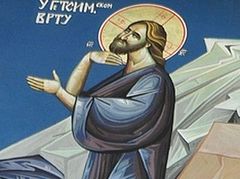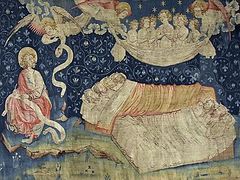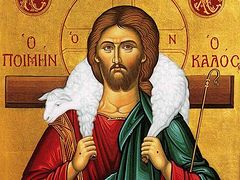How can we know God? The Creator Himself imparted to man the beginnings of wisdom and spirit, so that man might know Him and His will. Throughout our entire life, we are called to continually and ever more discover and know our Heavenly Father, to love Him, and to find our eternal blessings in Him. There is no creative work of any kind, whether in the realm of science, art, or other creative activity in the world, that is conceivable without that origin of reason and spirit. Through his faith, through higher intuitive comprehension, man begins to see and perceive God; with his inner hearing, man is capable of hearing Divine truth and love. The world was created with love that is greater than worldly love, and believers begin to love that love, to serve it amid all that is encountered in the world, all of the trials and tests the soul faces in preparing itself for its higher, eternal existence... The Gospel states that who has been faithful over a few things will be faithful over many things. The purpose and meaning of our earthly existence is to ascend through this brief, temporal, life, to eternal life on high.
All of the teachings of the Gospels are directed toward understanding of that very exalted, higher, meaning of life, love toward God and service to the Kingdom of love among men. Everyone is called to serve God and to help others, our brethren here on earth, in God’s truth. People are not simply one another’s brethren, but even more than brethren; they are blood relatives, brothers sharing the same Heavenly Father. Living in various countries, belonging to various peoples, they are all compatriots in one single Heavenly, eternal Native Land.
How does one come to knowledge of God? One obtains knowledge of God from four sources:
1. From God Himself, through His Divine Word and revelation of the Holy Spirit in the Church.
2. From God, through knowledge of the order of the world He created, of its harmony, its great loftiness, its beauty, its integrity and from how little it is comprehensible to man; and through познание of his own human nature and profundity. Honest higher learning leads ever more greatly toward knowledge of the mysteries of creation. Higher learning refutes faith in materialism; the very understanding of matter is constantly changing, approaching ever closer to the realm of the spirit.
3. We learn about God through a myriad of accounts of the saints, i.e. people who did not and do not utter falsehoods. Likewise, we learn about God from those sinners who have left their dark, sinful way of life and gone on into the bright holy life.
4. Finally, we learn about God through our own eternal souls, cleansing the conscience, through prayer and submission to God’s will, through obedience to God’s Commandments and directions...
From all these different sources, the same one Truth of God enters into our consciousness, feeds our subconscious and animates our higher consciousness. That is God’s revelation of Himself, and at the same time our expression of all true humanity, of what within us is capable of knowing God.
A wise Antiochian Christian who lived in antiquity used the following to explain the mystery of knowing God to a pagan: “If you should say ‘show me your God,’ I answer, ‘Show me your man, and I will show you my God. Show me what the eyes of your soul see…If the surface of a mirror is rusty, it cannot reflect the human face. Likewise, a man in whom there is sin cannot contemplate God.” The philosopher Plato had already arrived at the conclusion that the eye of the mind is given to us so that when clean it might be used to contemplate the true Reality that is “The fountain of all attainable by the mind…” It is “that one thing, beautiful and good, that appears in a flash in noble souls because of their affinity to and desire to see Him.”
The pure language of Truth, which illuminates and calms man, sounds in the Gospel words of Jesus Christ, Son of God and Son of Man. Let whosoever wishes to hear this word open the Gospels, let him likewise open his heart before the light of Jesus, let him delve without guile or doubt into the Gospel. There, open to us, is everything we can and should know about God, about man, and about the goals of human life.
The Gospels free us from the spirit of ignorance and evil; they draw out that hidden goodness in man and put it in the forefront of life. Christ’s Word cleanses and educates the inner depths of our human existence, “the heart,” the conscience.... Whosever wishes to know Truth must first of all open up within himself that man who is capable of knowing that Truth.
Christ says to us, “I am the vine, ye are the branches. He that abideth in me, and I in him, the same bringeth forth much fruit.” (John 15:5). “I am the Way…” (John 14: 6)... “I am the Door…” (John 10: 7).
There is our common human Path and our life in the Father. Christ Jesus is the focal point and the goal for the world, the Spirit of the human soul...
From: Parish Life, a publication of the Russian Orthodox Cathedral of St. John the Baptist (July 2018).
Used with permission.




